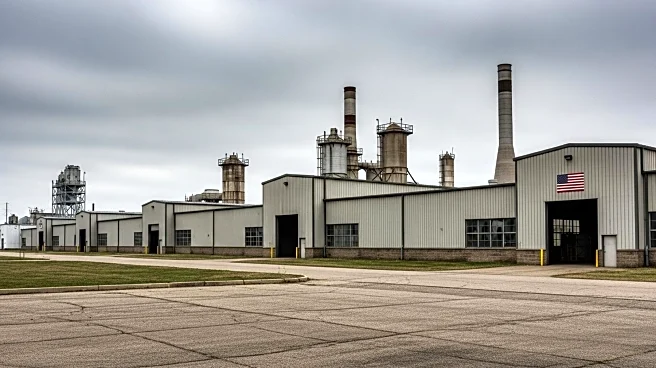What's Happening?
The U.S. manufacturing sector experienced a loss of 12,000 jobs in August 2025, marking a continued decline from its peak in February 2023. According to the Bureau of Labor Statistics, the sector has shed approximately 78,000 jobs over the past year. Economists attribute these losses to productivity gains and recent policies from President Trump's administration, including immigration crackdowns and increased trade tariffs. The average effective tariff rate has risen to 17.4%, the highest since 1935, impacting production costs for manufacturers reliant on imported goods. The Institute for Supply Management reported a contraction in manufacturing activity for the sixth consecutive month, with tariffs disrupting supply chains and causing price hikes.
Why It's Important?
The ongoing job losses in the manufacturing sector highlight significant challenges for U.S. economic stability and labor markets. The increased tariffs have raised production costs, affecting manufacturers' ability to maintain workforce levels. This situation poses risks to economic growth, as manufacturing is a key component of the U.S. economy. Businesses face uncertainty, leading to paused hiring and investment plans, which could further slow economic recovery. The sector's contraction impacts workers and communities reliant on manufacturing jobs, potentially leading to broader socio-economic consequences.
What's Next?
A full recovery in manufacturing employment appears challenging, with substantial investment required to return to historic employment levels. A Wells Fargo report suggests nearly $2.9 trillion in new capital investment is needed, far exceeding the $1.6 trillion secured by the administration. Stakeholders may need to consider policy adjustments to mitigate tariff impacts and stimulate investment. The sector's future will depend on balancing trade policies with economic growth strategies, potentially influencing political and business decisions.
Beyond the Headlines
The manufacturing sector's struggles may lead to long-term shifts in U.S. labor markets, with potential ethical and cultural implications. The reliance on productivity gains over workforce expansion raises questions about the future of work and the role of automation. Additionally, the impact of tariffs on global supply chains could alter international trade relationships, affecting U.S. competitiveness in the global market.











